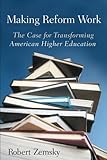Making Reform Work : The Case for Transforming American Higher Education / Robert Zemsky.
Material type: TextPublisher: New Brunswick, NJ : Rutgers University Press, [2009]Copyright date: ©2009Description: 1 online resource (256 p.) : 1Content type:
TextPublisher: New Brunswick, NJ : Rutgers University Press, [2009]Copyright date: ©2009Description: 1 online resource (256 p.) : 1Content type: - 9780813545912
- 9780813548463
- 378.73 22
- LA227.4 .Z45 2009eb
- online - DeGruyter
- Issued also in print.
| Item type | Current library | Call number | URL | Status | Notes | Barcode | |
|---|---|---|---|---|---|---|---|
 eBook
eBook
|
Biblioteca "Angelicum" Pont. Univ. S.Tommaso d'Aquino Nuvola online | online - DeGruyter (Browse shelf(Opens below)) | Online access | Not for loan (Accesso limitato) | Accesso per gli utenti autorizzati / Access for authorized users | (dgr)9780813548463 |
restricted access online access with authorization star
http://purl.org/coar/access_right/c_16ec
Making Reform Work is a practical narrative of ideas that begins by describing who is saying what about American higher educationùwho's angry, who's disappointed, and why. Most of the pleas for changing American colleges and universities that originate outside the academy are lamentations on a small number of too often repeated themes. The critique from within the academy focuses on issues principally involving money and the power of the market to change colleges and universities. Sandwiched between these perspectives is a public that still has faith in an enterprise that it really doesn't understand. Robert Zemsky, one of a select group of scholars who participated in Secretary of Education Margaret Spellings's 2005 Commission on the Future of Higher Education, signed off on the commission's report with reluctance. In Making Reform Work he presents the ideas he believes should have come from that group to forge a practical agenda for change. Zemsky argues that improving higher education will require enlisting faculty leadership, on the one hand, and, on the other, a strategy for changing the higher education system writ large. Directing his attention from what can't be done to what can be done, Zemsky provides numerous suggestions. These include a renewed effort to help students' performance in high schools and a stronger focus on the science of active learning, not just teaching methods. He concludes by suggesting a series of dislodging eventsùfor example, making a three-year baccalaureate the standard undergraduate degree, congressional rethinking of student aid in the wake of the loan scandal, and a change in the rules governing endowmentsùthat could break the gridlock that today holds higher education reform captive. Making Reform Work offers three rules for successful college and university transformation: don't vilify, don't play games, and come to the table with a well-thought-out strategy rather than a sharply worded lamentation.
Issued also in print.
Mode of access: Internet via World Wide Web.
In English.
Description based on online resource; title from PDF title page (publisher's Web site, viewed 24. Mai 2022)


